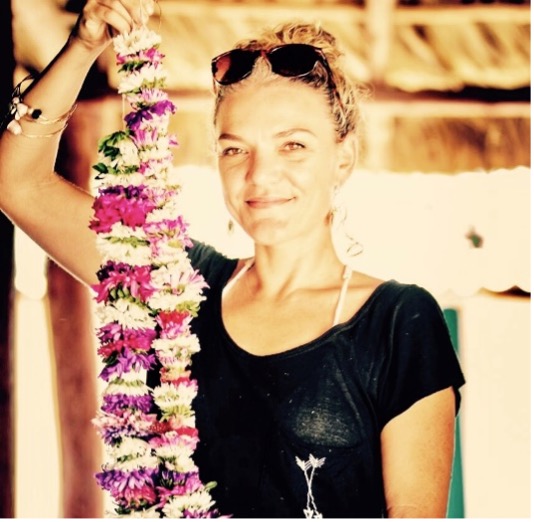Curator’s note: This week’s AEA365 posts contain Hawaiian language words that use certain diacritical markings. We make our best efforts to include these markings to be as culturally and grammatically accurate as possible, however, these markings often display as question marks or boxes, and may display differently on different browsers and devices. For best readability we have omitted some of those marks here.

Aloha kaua, I am Laurien Baird Hokuli’i Helfrich-Nuss. Born, raised and educated on two islands: O’ahu and Hawai‘i Island. I am a multi-ethnic, diasporic island woman dedicated to re-cultivating community resilience and wellbeing through the practice of culturally informed, community-centered solutions as the Climate Resilience and Equity Program Manager for the City and County of Honolulu Office of Climate Change, Sustainability and Resiliency.
Before entering government I established Conscious Concepts, a regenerative enterprise seeking to restore, repair and redefine sectors of society that are seeking new ways of doing good work and smart business. Rooted in aloha ‘aina (love of land), positioned at the cutting edge of a “living economy”, harnessing financial, relational & creative forms of currency to cultivate & restore our primary forms of true waiwai (wealth): ecological, cultural, social & spiritual capital.
Now in local city government with the challenging task of incorporating equity into policies, programs and systems within climate change and sustainability initiatives, I have come to realize that equity is both an outcome and a process in which everything should be centered around. It aims to ensure that all people have the opportunity to benefit from solutions, while not taking on an unequal burden of negative impacts. A large component of this also includes the correction of systemic fault lines in order to eliminate historically patterned disparate outcomes based on identity and circumstances.
Lessons Learned:
There is a great need to normalize an equity-centered lens within the climate conversation from a Pacific Island perspective. Increasing consensus has been affirming that prioritizing place-based and systems thinking frameworks in formulating holistic approaches to climate resiliency is critical in navigating the complexity we find ourselves in. In exploring what equity means in Hawai‘i, the community conversations we’ve had show us that the Hawaiian expression best fitting this is “pono”, which can be translated to english words such as harmony, balance, righteousness, goodness, uprightness, and morality.
Equity takes a holistic systems approach to understanding climate change, what it exacerbates and the causes of it. First understanding that climate change is the outcome of the degradation and destruction of natural ecosystems due to extractive, infinite growth economic practices that originate from the exploitation of land and labor and have provided disproportionate wealth accumulation for a small percentage and certain demographic of the population. Think of slavery, plantations, the fossil fuel industry, deforestation, industrial agriculture and the fashion industries to name a few.
A regenerative approach to equity starts within ourselves, then our workplaces and our communities. A life affirming decision making process that works with wholes and not just individual parts, with permeable boundaries not hard lines of demarcation, is better able to adapt, evolve and integrate equity with those other life support systems expressed in the place — be they hydrological, food-based, socio-cultural, political or economic.
[Further discussion is continued here].
Rad Resources:
- Loko I’a Needs Assessment
- Our Hawai‘i-Grown Truth, Racial Healing & Transformation: Recommitting to Mother Earth
- Making Equity Real in Climate Adaptation and Community Resilience Policies and Programs: A Guidebook
- Resources on Land Rematriation
- Holographic Epistemology: Native Common Sense
Hot Tip:
We include in each of our posts this week categories of well-being from Kukulu Kumuhana: Creating radical and new knowledge to improve Native Hawaiian Well-being. Today we offer ?aina momona – healthy land and people, being in balance with nature.
The American Evaluation Association is hosting CREA-HI Week. The contributions all this week to aea365 come from members of the Hawai’i affiliate of Cultural Responsive Evaluation and Assessment (CREA). Do you have questions, concerns, kudos, or content to extend this aea365 contribution? Please add them in the comments section for this post on the aea365 webpage so that we may enrich our community of practice. Would you like to submit an aea365 Tip? Please send a note of interest to aea365@eval.org. aea365 is sponsored by the American Evaluation Association and provides a Tip-a-Day by and for evaluators. These views and opinions do not necessarily represent those of the American Evaluation Association, and/or any/all contributors to this site.
